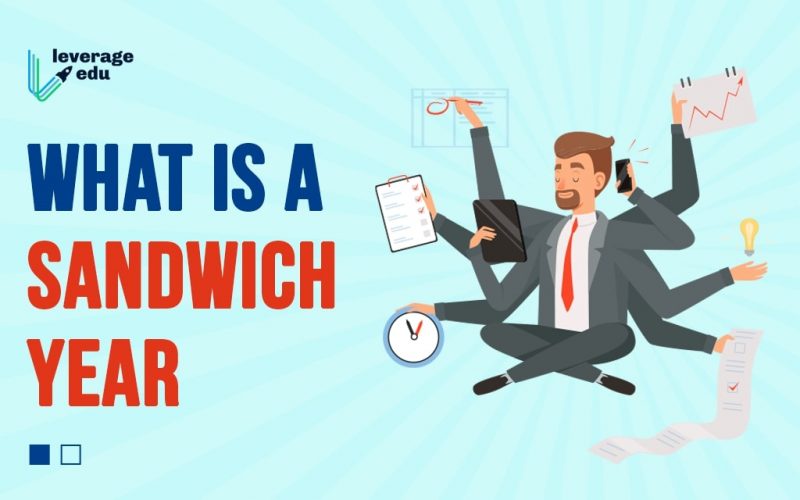If you are a Study Abroad student, you have heard about a Sandwich Year, right? A Sandwich year is exactly what it says it’s a year that is ‘sandwiched’ in-between the 3 or years of a degree/diploma that you may be enrolled in. Let me explain further about it.
What is a Sandwich Year
Many Study Abroad degree programs have coursework that is 3-4 years. Some of the universities, which offer courses that have a strong vocational relevance like Data Science, Pharmacy, bio-medical engineering, or even Foreign Language Study or a degree in Design, plan their program to give you one year of Placement that is directly relevant to your degree. This is usually after the first two years of the course. This is the SANDWICH year; also called the Industrial Placement Year. A Sandwich Year is popular with vocational courses, especially among UK universities like Bath, Lancaster, Surrey, Loughborough, and Aston. These universities actively encourage students to take advantage of this year of practical work experience because it makes their students job-ready.
Also Read: Amazing Jobs After Language Studies
How is a Sandwich Year different from a Regular Placement?
It is different because it is built into the degree or diploma that you enroll for. It is not like usual Placements which are done after a student completes the degree.
What happens in the Sandwich Year?
During the Placement Year, a student does not attend classes. The report for work where they get their Placement and they do industry-related assignments. These may be related to lab work, research, the manufacturing process, client handling, product testing, etc as per specific requirements of that industry.
What are the Benefits of the Sandwich Year?
There are clear benefits of taking a Placement year professional as well as financial
Professional Benefits
- After doing two years of a course in College, the Placement provides an excellent opportunity to see in practice how the knowledge gathered in your classroom can be applied in the real world.
- Apart from that, as a student, you gain very important exposure to how the industry of your choice operates. You learn about organizational cultures, teamwork, collaborations, manufacturing processes, client needs, market demands, etc.
- Thus, after the Placement when you return to the classroom for your final year, you bring experience and maturity to the classroom because you have been exposed to work processes, teamwork, and delivery of the product or services within your industry.
- Thus, after completing your degree when you appear in the job market, your employability is much higher. You are more knowledgeable, and you will be a more confident candidate during interviews. This always impresses recruiters because they can see that you are not just a ‘fresher’ with a degree!
Must Read: How To Choose The Right Study Abroad Destination
Financial Benefits
During the Placement year, when you do not avail of the in-class programs, many universities give a discount on your fees. This varies from college to college but can be up to 50%! This can be a huge saving for students. More importantly, Placement in the industry is usually paid. The remuneration may be less than the salary of a fully qualified professional, but it is enough to begin saving or at least you can begin to pay off some of the educational loans if you have taken any. So, either way, it is well worth working hard to get good grades in the first two years so that you are highly eligible to be a candidate for Placement.
Pro-Tip: Universities and colleges help provide information on their Career Websites. They also help with Resume-writing. However, getting a Placement for a student is NOT the responsibility of the university. You need to track the opportunities, build up your skill portfolio, and get good grades and referrals. Thus, as a student, you need to be alert to check when these lists are available on the Career Website of your university and then get going on the applications.
Tip 2: Advance planning: You need to apply to companies in September, a year BEFORE the Placement is supposed to start. Some of the bigger companies demand complex applications followed by rounds of interviews. So, plan in advance!
Should I sign up for a Placement Option before I go for my Study Abroad program?
Yes, You should sign-up for the Placement option before you go abroad. Even if you have work experience, don’t forgo the option. You can change your mind later. Once you have spent a year at the College, if you decide NOT to avail of it, you can opt-out.
Pro-Tip: It’s much more difficult to join a Placement Option later. It’s easier to opt-out. So keep your choices open!
Are There any Problems in Getting Industrial Placement?
Yes! The reason is obvious There are always more students in a class than the available placement opportunities.
Pro-Tip: You must maintain good grades in your first two years so that you have high eligibility to be considered by any company. If required, take counseling support for resume writing, cover letter, and building an impressive portfolio of your skills.
Overall, if you are considering a Study Abroad degree with high employability then a Sandwich year is a good investment. It takes you away from the university and exposes you to real-world job experience which can lead to excellent ROI (Return on Investment) in the long term. Good Luck! We will be back next Friday with another amazing blog from Dr.Maina Chawla Singh Till then, if you have any questions or suggestions, just drop us a comment and we will get back to you.
Check out other Blogs at:

 One app for all your study abroad needs
One app for all your study abroad needs






















 45,000+ students realised their study abroad dream with us. Take the first step today.
45,000+ students realised their study abroad dream with us. Take the first step today.

